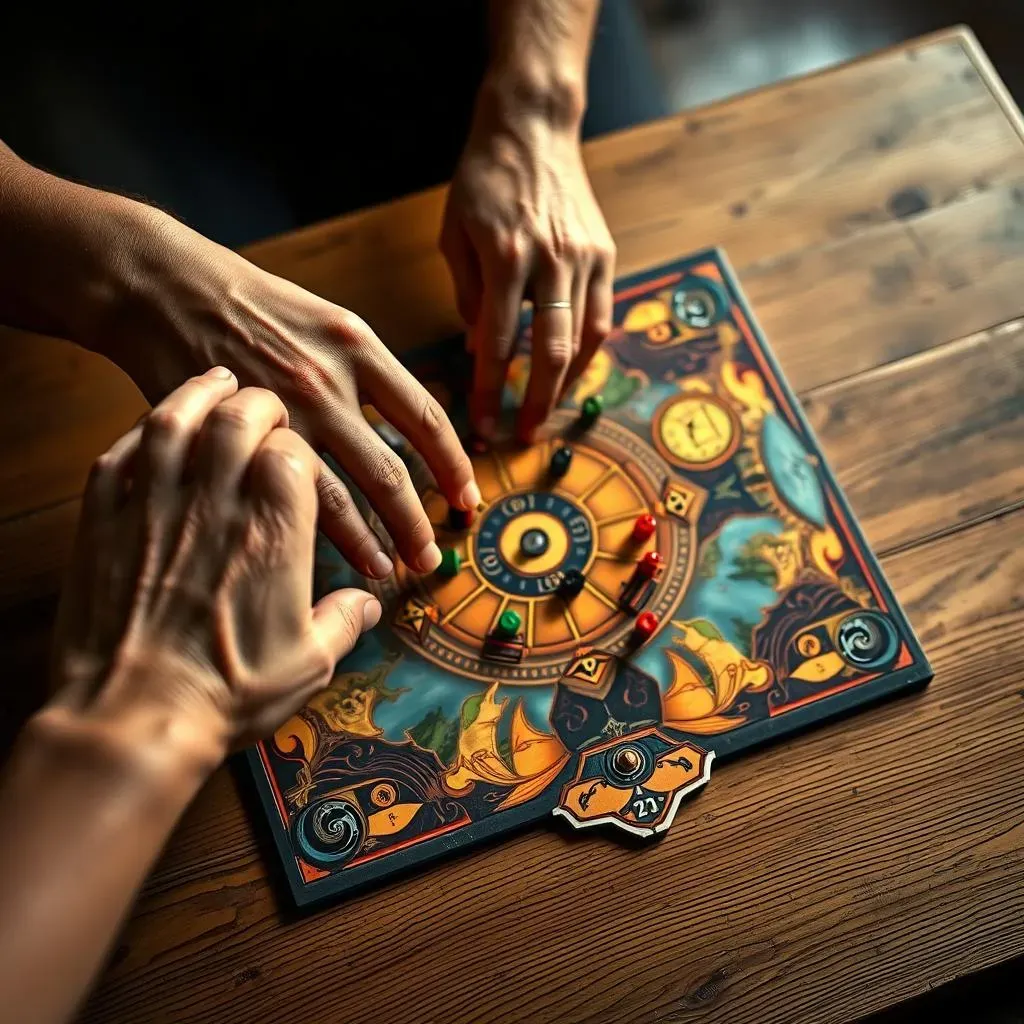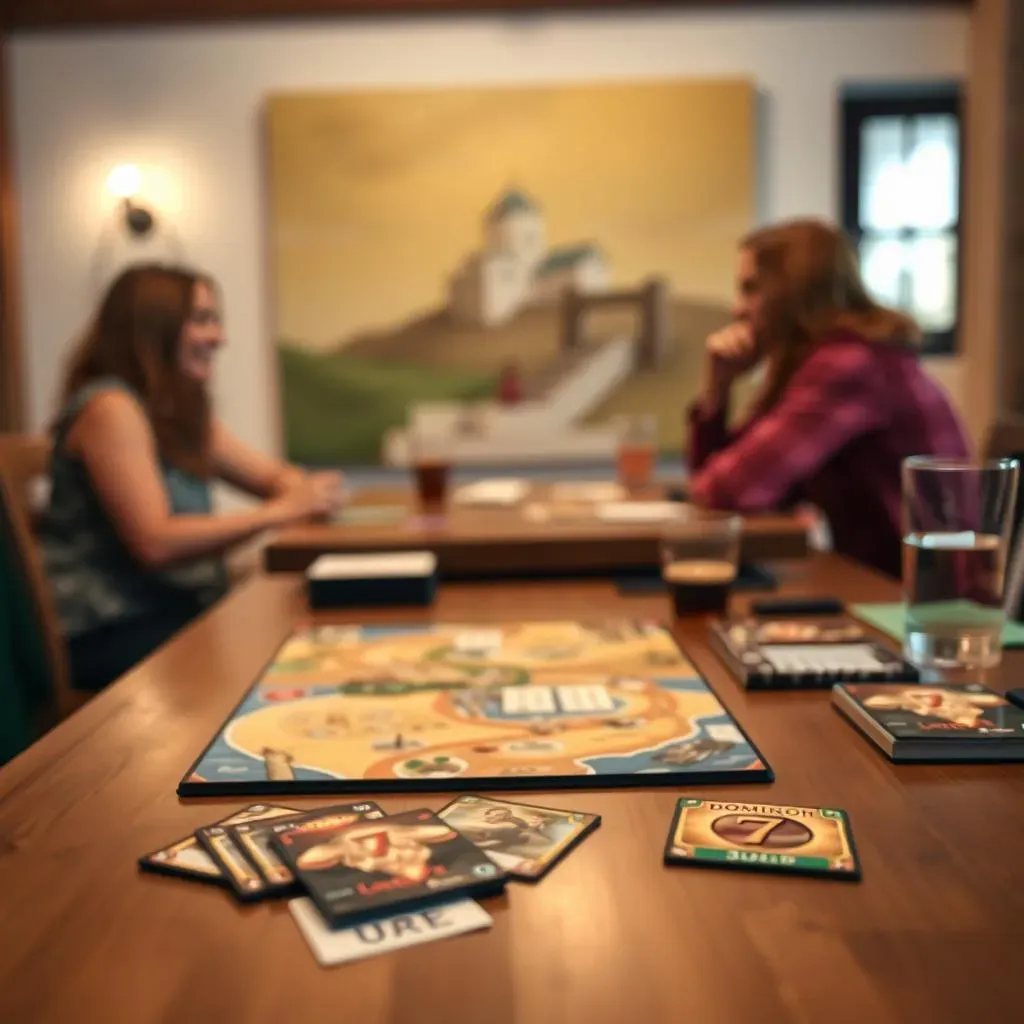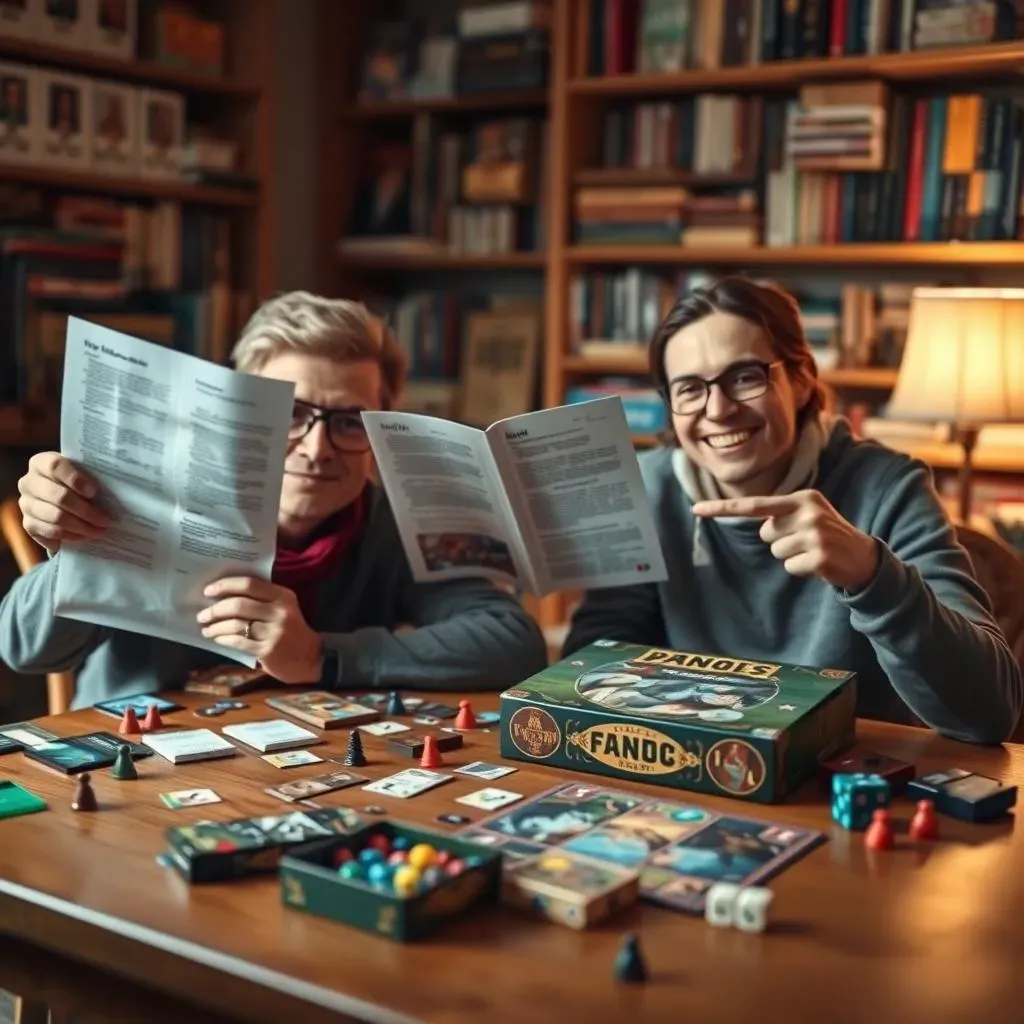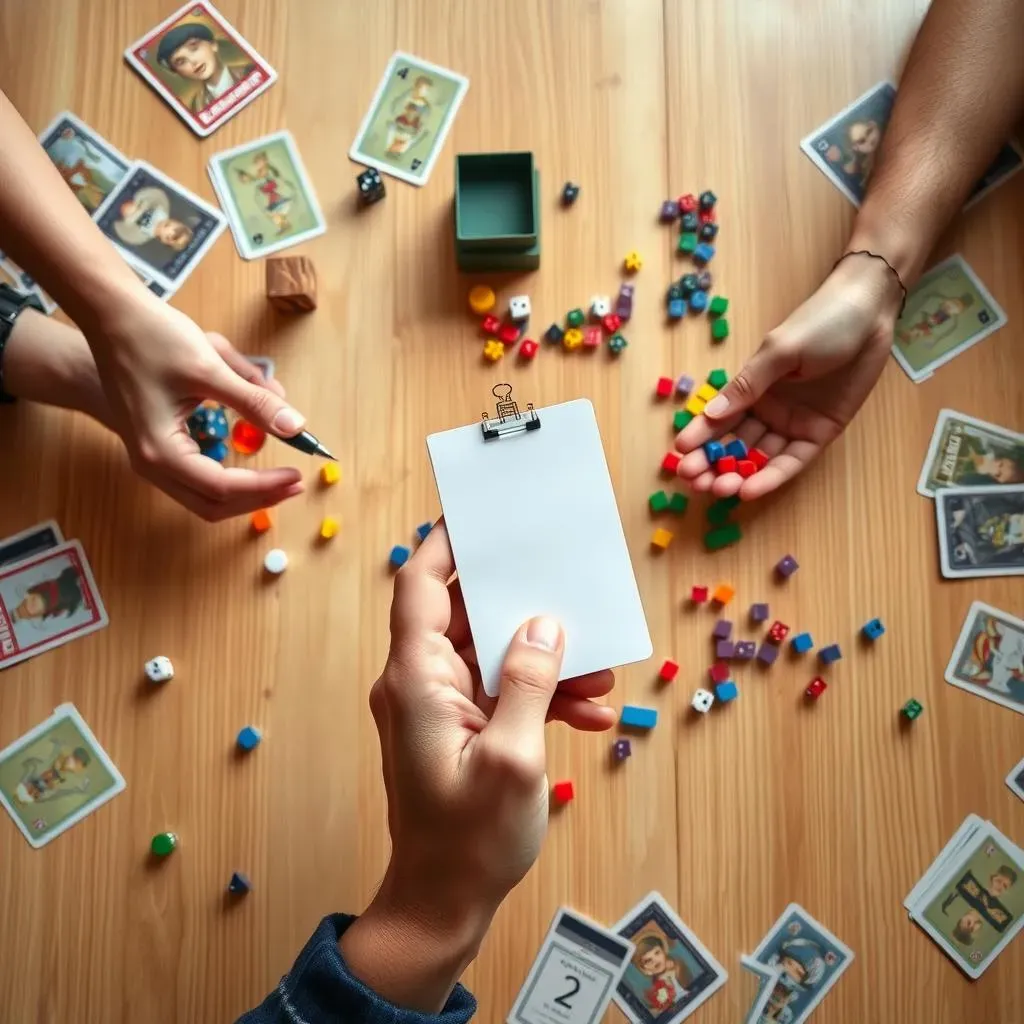Table of Contents
Ever find yourself with a free evening, just you and a friend, itching for some fun? Forget the same old movie night. It's time to unleash the power of board games! But let’s be real, some games get stale faster than week-old bread. That’s where the quest for the most replayable 2 player board games begins. This isn't about those games that gather dust after one play. We’re talking about the gems that keep you coming back for more, where each session feels fresh and exciting. In this article, we're not just listing games; we’re diving into why some 2 player games have that magical replayability factor. We'll explore the kinds of games that offer endless strategic possibilities and keep you engaged whether you’re a board game newbie or a seasoned pro. We’ll also give you the lowdown on how to pick the right game for you and some tips to get the most out of your gaming experience. Ready to discover your next favorite two-player obsession?
Why TwoPlayer Board Games Are Awesome
Why TwoPlayer Board Games Are Awesome
Let's be real, sometimes you just want to chill with one other person, and that’s where two-player board games shine. They’re not just smaller versions of their bigger counterparts. They're a whole different beast! Think of it like this: you get all the strategy, all the fun, but without the chaos of trying to coordinate six different people's schedules and opinions. It's focused, it’s engaging, and it’s a fantastic way to connect with someone. Plus, let’s face it, who hasn’t had a game night derailed by someone who just can’t follow the rules? With two-player games, it's just you and your opponent, a true battle of wits, and that’s what makes them so darn awesome. It's like having a mini-adventure right on your tabletop, no travel or extra people required.
I’ve had some epic battles over a tiny tabletop, let me tell you. There's something special about the intensity of a two-player game. It's like a perfectly balanced duel, where every move counts. Unlike a party game where you might be able to hide in the crowd, in a two-player game, it's all on you. You can see the gears turning in your opponent's head, you can feel the tension build with each move. It’s a fantastic way to challenge yourself and your friend, and it's way more satisfying than just watching another show. I mean, who needs a screen when you can have a face-off right on your kitchen table?
Benefit | Why It's Awesome |
|---|---|
Focused Interaction | It's just you and your opponent, making the game very personal. |
Strategic Depth | Every move matters, leading to exciting and intense gameplay. |
Easy to Schedule | No need to coordinate large groups, perfect for spontaneous game nights. |
Less Chaos | No rule-breakers or distractions, just pure gaming fun. |
Top Picks for Most Replayable 2 Player Board Games
Top Picks for Most Replayable 2 Player Board Games
Abstract Strategy: The Mind Games
If you're into games that make your brain sweat, abstract strategy games are where it's at. These are the kinds of games where you're not relying on luck; it's all about your planning and how well you can outsmart your opponent. Think chess, but with more modern twists. Games like "Santorini," with its variable player powers and building blocks, or "Onitama," a quick-paced game of movement and strategy, offer a huge amount of replayability because every game is different. The core mechanics stay the same, but the way you play can change wildly depending on your opponent’s moves. It's like a mental workout, and trust me, it's way more fun than it sounds.
These games aren't about fancy themes or complicated storylines; it’s about pure strategy. You're not just moving pieces; you're thinking several steps ahead, trying to predict your opponent's strategy while executing your own. It’s this constant back-and-forth that makes them so engaging, and every session feels like a fresh challenge. I remember one game of Santorini where I thought I had my opponent cornered, only for them to pull a move out of nowhere and completely flip the game. It's moments like that that keep you coming back for more.
Card-Driven Delights: Endless Combinations
Next up, let's talk about card games. They are fantastic for replayability because the combinations are practically endless. Games like "Dominion," where you build your deck as you play, or "7 Wonders Duel," a condensed version of the civilization-building classic, offer a different experience each time you play. The variety of cards means you’ll never have the exact same hand, leading to fresh strategies and new challenges. It's like every game is a new puzzle, and you're trying to find the best way to piece it together.
The best card games for two players are those that have a lot of different cards and combinations. I mean, who doesn't love a game where you can build your own engine, or create a combo that completely wipes out your opponent? It's not just about the luck of the draw; it's about how you adapt and make the best of what you have. Plus, card games are great because they usually don't have a ton of pieces, making them easy to set up and play anywhere. I’ve had some of my most memorable game nights with a deck of cards and a good friend.
Game Type | Examples | Why It's Replayable |
|---|---|---|
Abstract Strategy | Santorini, Onitama | Variable setups, deep strategy |
Card-Driven | Dominion, 7 Wonders Duel | Endless combinations, adaptable gameplay |
Thematic Twists: Storytelling on the Table
And finally, let’s not forget those games that tell a story. These are the games that pull you into their world with engaging themes and narratives. Think of games like "Gloomhaven: Jaws of the Lion," a campaign-based adventure that's perfect for two, or "Arkham Horror: The Card Game," where you’re working together to solve mysteries. These games are fantastic for replayability because they often have branching storylines and evolving characters, making each playthrough feel unique. It's not just about winning; it’s about the journey, the choices you make, and the story you create.
While some might think that story-based games lose their replay value once you know the story, the best ones have enough twists, turns, and variations to keep things interesting. It's like re-reading a good book, but this time, you're making the choices, and seeing how different decisions affect the outcome. I’ve spent hours exploring the world of "Gloomhaven" with a friend, and each time we play, we uncover something new. It’s the kind of experience that goes beyond just playing a game; it’s about building a shared memory and that's pretty awesome.
How to Choose the Best TwoPlayer Game for You
How to Choose the Best TwoPlayer Game for You
Know Thyself (and Your Partner)
Okay, so you're ready to dive into the world of two-player board games, but where do you even start? The first step is to really think about what you and your partner enjoy. Are you both into brain-burning puzzles, or do you prefer something more laid-back and thematic? Maybe one of you loves a good strategy game, while the other is all about the story. Knowing these preferences is super important because a game that one of you loves and the other hates isn't going to be replayable for either of you. It's like trying to watch a rom-com with someone who only watches action movies—it's not going to end well. Think about what kinds of activities you both enjoy, and look for games that match those interests.
I remember getting a super complex strategy game for my friend and me, thinking it would be a blast, but it turned out to be way too intense for her. She’s more of a chill card game kind of person. It was a good lesson in knowing my audience, and it taught me that the best game is the one that both players can enjoy, even if it means compromising a little. Don't be afraid to try different styles, but always keep in mind what you both find fun. It is a key for long term replayability!
Consider the Complexity
Next up, let's talk about complexity. Some games are super easy to learn, with simple rules and quick setup, while others are like learning a new language. If you and your partner are new to board games, starting with something simple is a great idea. You don't want to spend your entire game night reading through a rulebook, right? Games like "Ticket to Ride" or "Carcassonne" are easy to pick up and start playing right away, but they still have enough strategy to keep things interesting. But, if you both love a challenge and have a lot of time, then by all means, go for the more complex games. Just remember, the goal is to have fun, not to stress about the rules.
I’ve been there, staring at a rulebook that’s thicker than a novel. It’s not fun and it makes me want to give up before I even start playing. So, start simple, and as you get more comfortable with board games, you can always try something more complex. It’s all about finding the sweet spot where you’re challenged but not overwhelmed. Don’t be ashamed to watch a tutorial or two before you jump into a complex game, either. It’s better than spending hours arguing over a rule.
Factor | Consider This |
|---|---|
Preferences | Do you like strategy, stories, or a mix? |
Complexity | Easy to learn or brain-burning? |
Time Commitment | Quick games or long campaigns? |
Time Commitment and Setup
Lastly, think about how much time you’re willing to spend on a game. Some games can be played in 20-30 minutes, perfect for a quick weeknight session, while others can take hours, more suited for a weekend afternoon. Also, consider the setup time. Some games have tons of pieces and require a lot of prep before you can even start playing. If you’re looking for something quick and easy, a card game or a simple abstract strategy game might be a great choice. But if you’re up for a longer experience, a campaign game could be perfect. It's all about matching the game to your available time and energy.
I know that sometimes I want to play a game but I don't have the time or energy for a long session, and that's okay. It’s why having a variety of games on hand is a good idea. Sometimes you want a quick game of "Jaipur," and sometimes you want to get lost in a long campaign. The key is to have options that fit your mood and schedule. So, before you buy a game, check the box and see how long it’s supposed to take and if you have time. It might save you from feeling rushed or frustrated.
Maximizing Replayability in Your 2 Player Games
Maximizing Replayability in Your 2 Player Games
Mix It Up: Variations and House Rules
Okay, so you've found some awesome 2 player games, but how do you keep them fresh after playing them a bunch of times? One of the best ways is to mix things up with variations and house rules. This doesn't mean completely changing the game, but adding small tweaks can make a big difference. Maybe you decide to play with the cards in a different order, or add a slight change to how you score points. You could even create your own unique rules that fit your playstyle. It's like adding a secret ingredient to your favorite recipe; it keeps things interesting and makes each playthrough feel a bit different. Don't be afraid to experiment; you might stumble upon a way to make the game even more fun!
I've had so much fun coming up with crazy house rules for some of my favorite games. It's a great way to get creative and tailor the game to what you and your partner enjoy. For example, in a card game, we might decide that certain cards have a slightly different effect, or we might create a new way to score bonus points. It's like you are co-designing the game, and it really adds a new level of engagement. It also keeps you on your toes because you never know what weird rule your partner might throw at you next. Just make sure you both agree on the rules before you start, or things could get a bit chaotic.
Explore Expansions and New Content
Another fantastic way to boost the replayability of your games is to explore expansions and new content. Many popular two-player games have expansions that add new cards, new mechanics, or even new storylines. These expansions can breathe new life into a game you thought you'd mastered, providing new challenges and strategies to explore. It's like upgrading your favorite video game; it keeps the core experience you love, but adds fresh elements to keep you hooked. If you find yourself getting bored with a game, check if there are any expansions available, and you might just fall in love with it all over again.
I've seen some games totally transform with just one expansion. It's like they are a completely different game. I love the feeling of discovering new strategies and possibilities that come with new content. Just make sure you do a little research before you buy, and see if the expansion is a good fit for you and your playstyle. Some expansions add complexity, while others add a new layer of theme or storytelling. Choose one that matches your preference, and it can extend the life of your favorite games. And if you really love a game, it’s a great way to support the designers and developers who made it.
Strategy | How to Use It |
|---|---|
House Rules | Create your own rules to add unique twists. |
Variations | Adjust the setup or scoring for fresh gameplay. |
Expansions | Add new content to expand the game's possibilities. |
New Content | Look for new cards, mechanics, and storylines. |
Wrapping Up: Your Journey to Endless Two-Player Fun
Finding the most replayable 2 player board games isn't just about buying a box; it's about discovering experiences that you and your gaming partner will enjoy again and again. The right game can transform a quiet evening into a thrilling adventure, a battle of wits, or a collaborative story. Whether you're drawn to the strategic depth of deck-builders, the quick pace of card games, or the intricate planning of area control games, the key is to explore what resonates with you both. Don't be afraid to try new things, adapt your strategies, and most importantly, have fun. With the guidance in this article, you're now equipped to pick a game that will provide countless hours of enjoyment. So, gather your friend, pick a game, and let the good times roll!